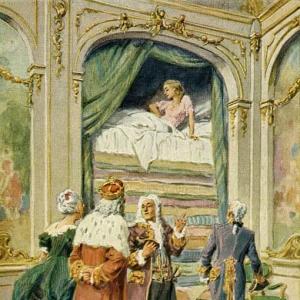Reading time for children: 15 min
Hans had served his master for seven years, so he said to him, „Master, my time is up. Now I should be glad to go back home to my mother; give me my wages.“ The master answered, „You have served me faithfully and honestly; as the service was so shall the reward be;“ and he gave Hans a piece of gold as big as his head. Hans pulled his handkerchief out of his pocket, wrapped up the lump in it, put it on his shoulder, and set out on the way home.
As he went on, always putting one foot before the other, he saw a horseman trotting quickly and merrily by on a lively horse. „Ah!“ said Hans quite loud, „what a fine thing it is to ride! There you sit as on a chair. You stumble over no stones, you save your shoes, and get on, you don’t know how.“ The rider, who had heard him, stopped and called out, „Hollo! Hans, why do you go on foot, then?“
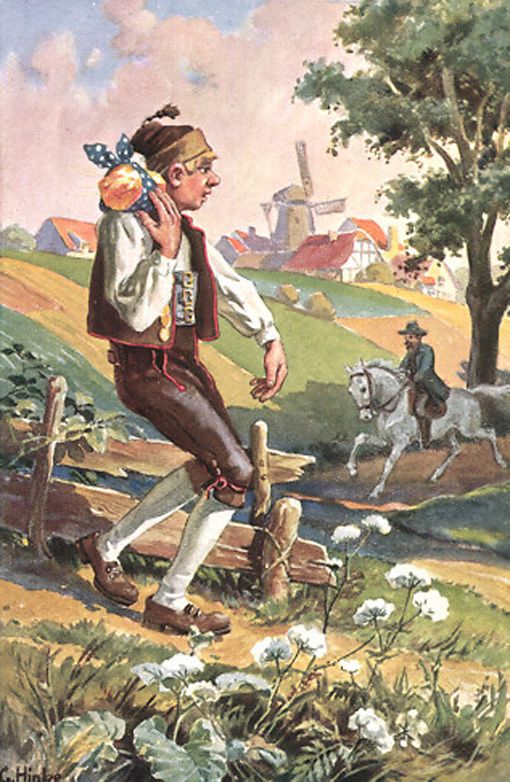 Image: George Hinke (1883 – 1953)
Image: George Hinke (1883 – 1953)„I must,“ answered he, „for I have this lump to carry home. It is true that it is gold, but I cannot hold my head straight for it, and it hurts my shoulder.“ – „I will tell you what,“ said the rider, „we will exchange: I will give you my horse, and you can give me your lump.“ – „With all my heart,“ said Hans, „but I can tell you, you will have to crawl along with it.“ The rider got down, took the gold, and helped Hans up. Then gave him the bridle tight in his hands and said, „If you want to go at a really good pace, you must click your tongue and call out, „Jup! Jup!“
Hans was heartily delighted as he sat upon the horse and rode away so bold and free. After a little while he thought that it ought to go faster, and he began to click with his tongue and call out, „Jup! Jup!“ The horse put himself into a sharp trot, and before Hans knew where he was, he was thrown off and lying in a ditch which separated the field from the highway.
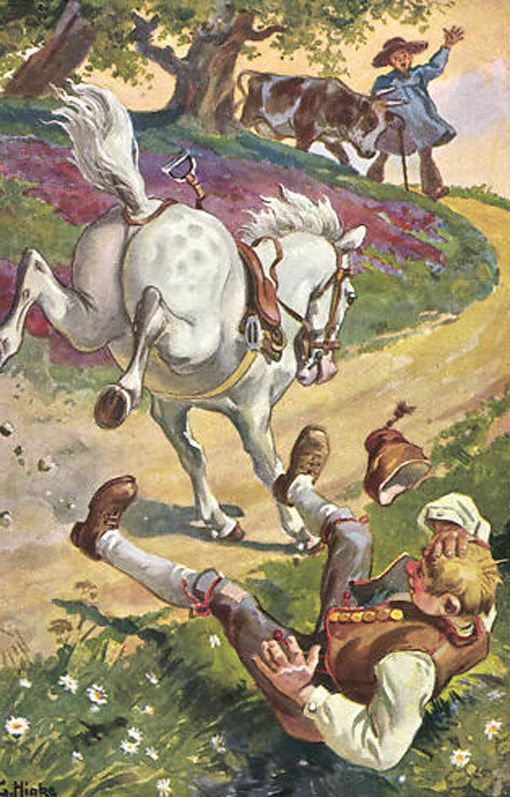 Image: George Hinke (1883 – 1953)
Image: George Hinke (1883 – 1953)The horse would have gone off too if it had not been stopped by a countryman, who was coming along the road and driving a cow before him. Hans got his limbs together and stood up on his legs again, but he was vexed, and said to the countryman, „It is a poor joke, this riding, especially when one gets hold of a mare like this, that kicks and throws one off, so that one has a chance of breaking one’s neck. Never again will I mount it.
Now I like your cow, for one can walk quietly behind her, and have, over and above, one’s milk, butter and cheese every day without fail. What would I not give to have such a cow.“ – „Well,“ said the countryman, „if it would give you so much pleasure, I do not mind giving the cow for the horse.“ Hans agreed with the greatest delight. The countryman jumped upon the horse, and rode quickly away.
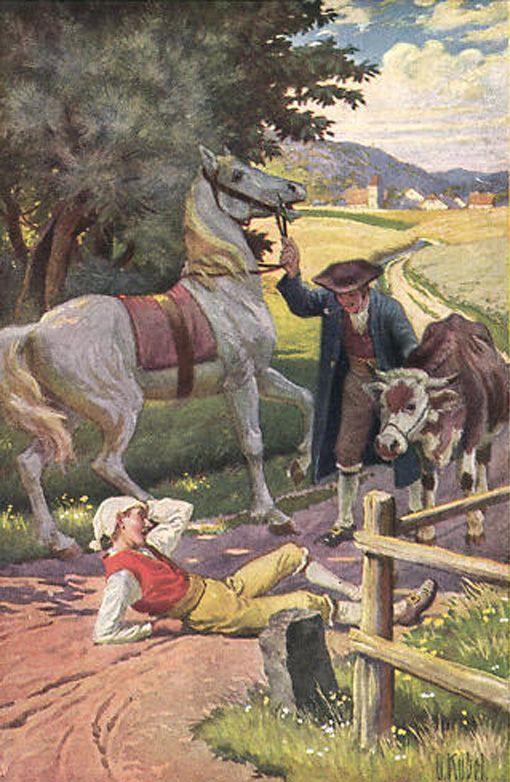 Image: Otto Kubel (1868 – 1951)
Image: Otto Kubel (1868 – 1951)Hans drove his cow quietly before him, and thought over his lucky bargain. „If only I have a morsel of bread — and that can hardly fail me — I can eat butter and cheese with it as often as I like. If I am thirsty, I can milk my cow and drink the milk. Good heart, what more can I want?“ When he came to an inn he made a halt, and in his great content ate up what he had with him — his dinner and supper — and all he had, and with his last few farthings had half a glass of beer. Then he drove his cow onwards along the road to his mother’s village.
As it drew nearer mid-day, the heat was more oppressive, and Hans found himself upon a moor which it took about an hour to cross. He felt it very hot and his tongue clave to the roof of his mouth with thirst. „I can find a cure for this,“ thought Hans; „I will milk the cow now and refresh myself with the milk.“ He tied her to a withered tree, and as he had no pail he put his leather cap underneath; but try as he would, not a drop of milk came. And as he set himself to work in a clumsy way, the impatient beast at last gave him such a blow on his head with its hind foot, that he fell on the ground, and for a long time could not think where he was.
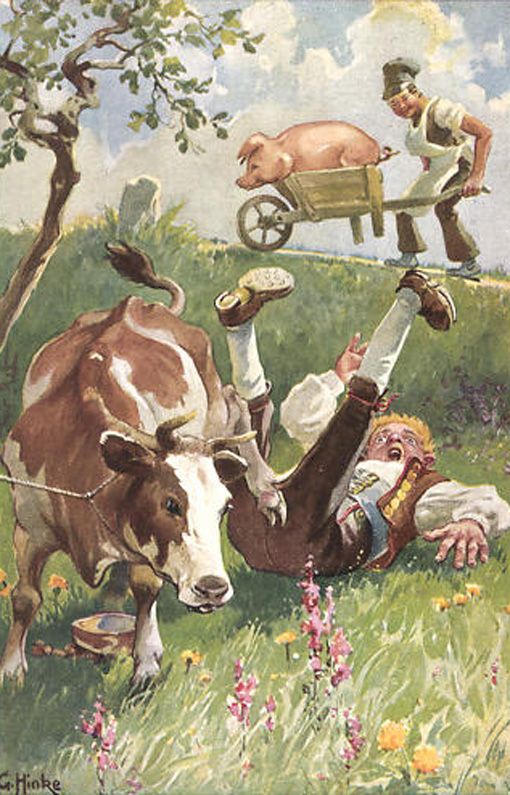 Image: George Hinke (1883 – 1953)
Image: George Hinke (1883 – 1953)By good fortune a butcher just then came along the road with a wheel-barrow, in which lay a young pig. „What sort of a trick is this?“ cried he, and helped the good Hans up. Hans told him what had happened. The butcher gave him his flask and said, „Take a drink and refresh yourself. The cow will certainly give no milk, it is an old beast; at the best it is only fit for the plough, or for the butcher.“ – „Well, well,“ said Hans, as he stroked his hair down on his head, „who would have thought it? Certainly it is a fine thing when one can kill a beast like that at home. What meat one has! But I do not care much for beef, it is not juicy enough for me. A young pig like that now is the thing to have, it tastes quite different; and then there are the sausages!“
„Hark ye, Hans,“ said the butcher, „out of love for you I will exchange, and will let you have the pig for the cow.“ – „Heaven repay you for your kindness!“ said Hans as he gave up the cow, whilst the pig was unbound from the barrow, and the cord by which it was tied was put in his hand. Hans went on, and thought to himself how everything was going just as he wished. If he did meet with any vexation it was immediately set right. Presently there joined him a lad who was carrying a fine white goose under his arm. They said good morning to each other, and Hans began to tell of his good luck, and how he had always made such good bargains.
 Image: George Hinke (1883 – 1953)
Image: George Hinke (1883 – 1953)The boy told him that he was taking the goose to a christening-feast. „Just lift her,“ added he, and laid hold of her by the wings; „how heavy she is — she has been fattened up for the last eight weeks. Whoever has a bit of her when she is roasted will have to wipe the fat from both sides of his mouth.“ – „Yes,“ said Hans, as he weighed her in one hand, „she is a good weight, but my pig is no bad one.“
Meanwhile the lad looked suspiciously from one side to the other, and shook his head. „Look here,“ he said at length, „it may not be all right with your pig. In the village through which I passed, the Mayor himself had just had one stolen out of its sty. I fear — I fear that you have got hold of it there. They have sent out some people and it would be a bad business if they caught you with the pig; at the very least, you would be shut up in the dark hole.“
The good Hans was terrified. „Goodness!“ he said, „help me out of this fix. You know more about this place than I do, take my pig and leave me your goose.“ – „I shall risk something at that game,“ answered the lad, „but I will not be the cause of your getting into trouble.“ So he took the cord in his hand, and drove away the pig quickly along a by-path. The good Hans, free from care, went homewards with the goose under his arm.
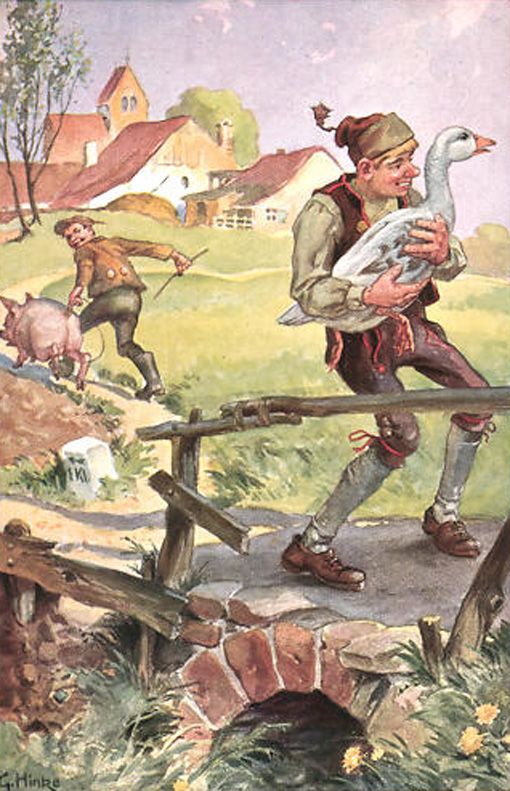 Image: George Hinke (1883 – 1953)
Image: George Hinke (1883 – 1953)„When I think over it properly,“ said he to himself, „I have even gained by the exchange; first there is the good roast-meat, then the quantity of fat which will drip from it, and which will give me dripping for my bread for a quarter of a year, and lastly the beautiful white feathers. I will have my pillow stuffed with them, and then indeed I shall go to sleep without rocking. How glad my mother will be!“ As he was going through the last village, there stood a scissors-grinder with his barrow; as his wheel whirred he sang —
„I sharpen scissors and quickly grind,
My coat blows out in the wind behind.“
Hans stood still and looked at him; at last he spoke to him and said, „All’s well with you, as you are so merry with your grinding.“ – „Yes,“ answered the scissors-grinder, „the trade has a golden foundation. A real grinder is a man who as often as he puts his hand into his pocket finds gold in it. But where did you buy that fine goose?“
„I did not buy it, but exchanged my pig for it.“
„And the pig?“
„That I got for a cow.“
„And the cow?“
„I took that instead of a horse.“
„And the horse?“
„For that I gave a lump of gold as big as my head.“
„And the gold?“
„Well, that was my wages for seven years‘ service.“
„You have known how to look after yourself each time,“ said the grinder. „If you can only get on so far as to hear the money jingle in your pocket whenever you stand up, you will have made your fortune.“ – „How shall I manage that?“ said Hans. „You must be a grinder, as I am; nothing particular is wanted for it but a grindstone, the rest finds itself. I have one here. It is certainly a little worn, but you need not give me anything for it but your goose. Will you do it?“
„How can you ask?“ answered Hans. „I shall be the luckiest fellow on earth. If I have money whenever I put my hand in my pocket, what need I trouble about any longer?“ and he handed him the goose and received the grindstone in exchange. „Now,“ said the grinder, as he took up an ordinary heavy stone that lay by him, „here is a strong stone for you into the bargain. You can hammer well upon it, and straighten your old nails. Take it with you and keep it carefully.“
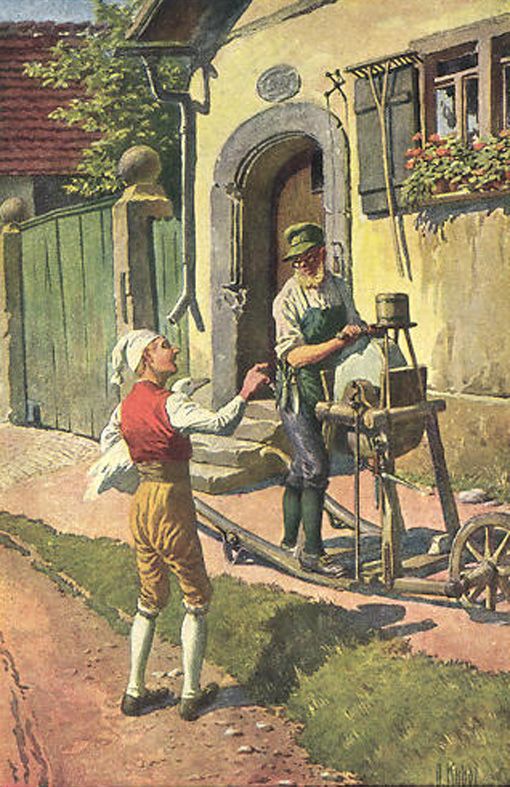 Image: Otto Kubel (1868 – 1951)
Image: Otto Kubel (1868 – 1951)Hans loaded himself with the stones, and went on with a contented heart. His eyes shone with joy. „I must have been born with a caul,“ he cried; „everything I want happens to me just as if I were a Sunday-child.“
Meanwhile, as he had been on his legs since daybreak, he began to feel tired. Hunger also tormented him, for in his joy at the bargain by which he got the cow he had eaten up all his store of food at once. At last he could only go on with great trouble, and was forced to stop every minute. The stones, too, weighed him down dreadfully. Then he could not help thinking how nice it would be if he had not to carry them just then.
He crept like a snail to a well in a field, and there he thought that he would rest and refresh himself with a cool draught of water, but in order that he might not injure the stones in sitting down, he laid them carefully by his side on the edge of the well. Then he sat down on it, and was to stoop and drink, when he made a slip, pushed against the stones, and both of them fell into the water.
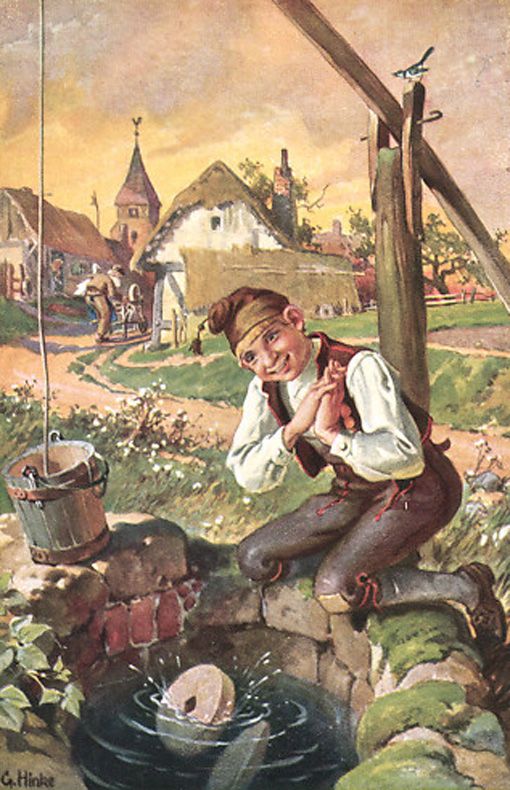 Image: George Hinke (1883 – 1953)
Image: George Hinke (1883 – 1953)When Hans saw them with his own eyes sinking to the bottom, he jumped for joy, and then knelt down, and with tears in his eyes thanked God for having shown him this favour also, and delivered him in so good a way, and without his having any need to reproach himself, from those heavy stones which had been the only things that troubled him. „There is no man under the sun so fortunate as I,“ he cried out. With a light heart and free from every burden he now ran on until he was with his mother at home.
 Learn languages. Double-tap on a word.Learn languages in context with Childstories.org and Deepl.com.
Learn languages. Double-tap on a word.Learn languages in context with Childstories.org and Deepl.com.Backgrounds to fairy tale „Hans in Luck“
„Hans in Luck“ is a German fairy tale collected by the Brothers Grimm, Jacob and Wilhelm, as part of their seminal work, „Grimms‘ Fairy Tales“ (also known as „Kinder- und Hausmärchen“). The original version was first published in 1812, and since then, it has become a classic story enjoyed by many generations.
The Brothers Grimm were German scholars, linguists, and cultural researchers who sought to preserve and document the traditional folktales and stories of their time. They were part of the Romantic Movement, which emphasized the importance of oral tradition and the preservation of cultural heritage. This movement was a response to the rapid industrialization and urbanization that was taking place across Europe.
The fairy tale „Hans in Luck“ is a simple, yet poignant tale about a young man named Hans who embarks on a journey to exchange his possessions, each time believing he has made a better trade. The story serves as a reflection on the concepts of luck, happiness, and contentment, as well as the value we place on material possessions.
The origins of „Hans in Luck“ can be traced back to European oral storytelling traditions. The story has been passed down through generations and adapted in different regions, each adding their own cultural nuances. The Brothers Grimm collected the version of the story that has become the most widely known and loved, but many variations still exist.
The story of „Hans in Luck“ revolves around the protagonist, Hans, who works for seven years as a servant and receives a lump of gold as his payment. Along his journey back home, Hans trades the gold for a series of seemingly less valuable items, ultimately ending up with nothing. Despite his apparent misfortune, Hans remains content and considers himself lucky.
The Brothers Grimm’s tales have been adapted and retold in many forms, including literature, theater, and film. Their stories have become an integral part of Western culture and continue to captivate audiences of all ages. While the tales were initially intended for children, their themes and lessons can be appreciated by readers of all ages, as they often explore complex human emotions, societal norms, and moral lessons.
In summary, „Hans in Luck“ is a classic fairy tale from the Brothers Grimm that has its roots in European folklore and oral storytelling traditions. The story, while simple, conveys important lessons about happiness, luck, and the value of material possessions, which have resonated with readers and listeners throughout the centuries.
Interpretations to fairy tale „Hans in Luck“
„Hans in Luck“ can be interpreted in various ways, depending on the reader’s perspective. Here are some common interpretations of the fairy tale:
The relativity of happiness and contentment: Hans believes he is becoming increasingly lucky with each trade he makes, even though the value of the items he acquires diminishes. This suggests that happiness and contentment are subjective and not necessarily tied to material possessions. Hans’s ability to find joy in his perceived fortune highlights the importance of one’s attitude and outlook on life.
The folly of materialism: Throughout the story, Hans trades down his possessions, yet he feels happier with each exchange. This can be interpreted as a commentary on the emptiness of materialism and the pursuit of wealth for its own sake. By the end of the tale, Hans has nothing, but he is content because he believes he has made wise choices.
Simplicity and freedom: Hans’s journey can be seen as a celebration of simplicity and freedom. As he continues to trade down his possessions, he is unburdened by material belongings and feels lighter and more carefree. This interpretation emphasizes the value of a simple, unencumbered life.
The importance of perspective: The story of Hans in Luck shows that perspective plays a significant role in determining one’s happiness. Although Hans loses material value with each trade, he always sees the positive side of the situation, believing that he has made a good deal. This interpretation highlights the power of maintaining a positive outlook, even in the face of adversity.
A cautionary tale: Some may interpret the story as a cautionary tale, warning against naivety and gullibility. Hans’s lack of worldly experience leads him to make seemingly unwise trades, which could be seen as a reminder to approach life with a healthy dose of skepticism and critical thinking.
Contentment: One interpretation of the tale is that it teaches the importance of contentment. Despite making seemingly poor decisions throughout the story, Hans remains happy and content with his circumstances. His positive outlook and satisfaction with what he has, regardless of its value, can be seen as a reminder to readers to focus on the good in their lives and be grateful for what they have.
Naivety and Gullibility: Hans‘ naivety and gullibility are also central themes in the story. His willingness to make hasty and unwise trades, often with strangers, highlights the importance of being cautious and thinking critically before making decisions. This interpretation can serve as a cautionary tale, urging readers to avoid being taken advantage of by others and to carefully consider their choices.
The Journey and Life Lessons: Another interpretation of the story is the focus on Hans‘ journey and the life lessons he learns along the way. Although Hans loses material possessions throughout the story, he gains experience, wisdom, and eventually freedom from burdens. This interpretation emphasizes the idea that the journey of life is filled with ups and downs, and that personal growth and learning can be more valuable than material possessions.
The Illusion of Wealth and Happiness: The tale can also be interpreted as a critique of the idea that wealth and material possessions lead to happiness. Hans starts with a valuable piece of gold, but as he trades it for items of lesser value, he still feels happy and lucky. This suggests that true happiness and contentment come from within, not from external sources.
Ultimately, „Hans in Luck“ offers various interpretations that can be taken from the tale, each providing valuable insights into human nature, happiness, and the role of material possessions in our lives.
Adaptions of the fairy tale „Hans in Luck“
Several adaptations of the fairy tale „Hans in Luck“ have been created over the years, ranging from illustrated children’s books to theater performances, and even film adaptations. Some specific examples of these adaptations include:
Children’s books: There have been numerous illustrated children’s books retelling the story of „Hans in Luck.“ These books often provide colorful illustrations and simplified text to make the story more accessible and engaging for younger readers. Some examples include „Hans in Luck“ by Paul Galdone and „Hans in Luck: A Grimm’s Fairy Tale“ retold by Carol Ottolenghi. The children’s book „Hans in Luck“ by reteller Rumer Godden and illustrator Alice and Martin Provensen was published in 1956. The book features colorful illustrations and a simplified retelling of the story for young readers. The story has also been retold in various children’s books, including „The Wonderful Wizard of Oz“ by L. Frank Baum and „The Little Engine That Could“ by Watty Piper, which both feature characters who learn the lesson of contentment over material possessions.
Theater performances: The story of „Hans in Luck“ has been adapted for the stage in various forms, including puppet shows, children’s plays, and musicals. One such example is the children’s musical „Hans in Luck,“ by David Wood, which was first performed in 1991. The musical features catchy songs and engaging storytelling, making it a popular choice for schools and children’s theater groups.
Animated films and television shows: „Hans in Luck“ has also been adapted into animated films and television episodes. One example is the 1988 Soviet animated short film „Везунчик Ганс“ (Lucky Hans), directed by Natalia Golovanova. The animation captures the whimsical nature of the fairy tale while providing a visually engaging experience for viewers. Additionally, the story has been featured in various television series dedicated to fairy tales, such as „Grimm’s Fairy Tale Classics“ (1987-1989) and „Simsala Grimm“ (1999-2010). The Disney film „The Adventures of Ichabod and Mr. Toad“ (1949) features a segment based on „Hans in Luck“ called „The Golden Touch.“ In this adaptation, the character John is given a magical ability to turn everything he touches into gold, but he ultimately learns the same lesson as Hans about the true value of happiness. The German animated film „Hans im Glück“ was released in 1989. This adaptation stays true to the original story but adds more depth to the character of Hans and includes a musical score. In 2013, the story was adapted into a short film called „Hans in Luck“ by director Stefan Jäger. This adaptation modernizes the story by setting it in a contemporary urban environment and adding elements of magical realism.
Audio adaptations: Audio adaptations of „Hans in Luck“ are available in the form of audiobooks and radio plays. These adaptations provide an immersive storytelling experience, often featuring sound effects, music, and voice actors to bring the tale to life. For example, the BBC Radio has produced a dramatized version of „Hans in Luck“ as part of their „Tales from the Brothers Grimm“ series.
These adaptations demonstrate the enduring appeal and versatility of the „Hans in Luck“ fairy tale. The story continues to captivate audiences in various formats, ensuring its place in popular culture and preserving its important themes and lessons for future generations. Overall, „Hans in Luck“ has proven to be a popular and enduring fairy tale that continues to inspire new adaptations and interpretations.
Summary of the plot
„Hans in Luck“ is a German fairy tale collected by the Brothers Grimm, who were Jacob and Wilhelm Grimm. The tale is part of their famous collection, „Grimms‘ Fairy Tales“ (originally titled „Children’s and Household Tales“ or „Kinder- und Hausmärchen“), first published in 1812. The collection contains over 200 stories, including other well-known tales like „Cinderella,“ „Snow White,“ „Rapunzel,“ and „The Frog Prince.“ The Brothers Grimm were scholars, linguists, and cultural researchers who aimed to preserve German folklore and traditional stories.
„Hans in Luck“ is a fairy tale from the Brothers Grimm that follows the story of a young man named Hans, who believes he is becoming increasingly lucky with each trade he makes, despite the diminishing value of the items he acquires. The story begins with Hans finishing his seven-year apprenticeship and receiving a large lump of gold as payment from his master. On his way home, Hans finds the gold heavy and cumbersome to carry, so he trades it for a horse, believing it to be a more practical and valuable possession. As Hans continues his journey, he encounters various individuals and makes a series of trades.
Each time, he believes he has made a better deal, despite trading down in material value. He trades his horse for a cow, the cow for a pig, the pig for a goose, and finally, the goose for a simple grinding stone. When Hans accidentally drops the grinding stone into a well, he feels relieved and even luckier, as he no longer needs to carry anything. With a light heart and a cheerful spirit, Hans returns to his mother, believing he is the luckiest man alive, even though he has nothing left of his original fortune. This tale teaches valuable lessons about happiness, luck, and the true worth of material possessions.
The plot of the fairy tale
„Hans in Luck“ is a fairy tale by the Brothers Grimm that tells the story of a man named Hans, who after serving his master for seven years, receives a lump of gold as his wages. On his way home, Hans comes across a series of individuals who offer to trade various items with him, which he believes to be increasingly advantageous.
First, Hans exchanges the gold for a horse, thinking that riding would be more comfortable than walking. However, the horse throws him off, and he trades it with a countryman for a cow, believing it to be a source of milk, butter, and cheese. Later, Hans trades the cow with a butcher for a pig, thinking it to be a better source of meat.
Continuing his journey, Hans meets a lad carrying a goose, who warns Hans that his pig may be stolen property. Fearful of being arrested, Hans trades the pig for the goose. Finally, Hans encounters a scissors-grinder who convinces him to trade the goose for a grindstone, promising it will bring him wealth.
Tired and hungry, Hans stops to rest by a well, where he accidentally drops the grindstone and a heavy stone he received from the scissors-grinder into the water. Surprisingly, Hans is overjoyed by this, feeling relieved of his burdens, and thanks God for his good fortune. With a light heart, he returns home to his mother, considering himself the luckiest man alive.
Informations for scientific analysis
Fairy tale statistics | Value |
|---|---|
| Number | KHM 83 |
| Aarne-Thompson-Uther-Index | ATU Typ 1415 |
| Translations | DE, EN, DA, ES, FR, PT, FI, HU, IT, JA, NL, PL, RU, TR, VI, ZH |
| Readability Index by Björnsson | 25.6 |
| Flesch-Reading-Ease Index | 89.2 |
| Flesch–Kincaid Grade-Level | 5 |
| Gunning Fog Index | 7.8 |
| Coleman–Liau Index | 6.3 |
| SMOG Index | 7.1 |
| Automated Readability Index | 4.7 |
| Character Count | 10.388 |
| Letter Count | 7.734 |
| Sentence Count | 122 |
| Word Count | 2.061 |
| Average Words per Sentence | 16,89 |
| Words with more than 6 letters | 179 |
| Percentage of long words | 8.7% |
| Number of Syllables | 2.447 |
| Average Syllables per Word | 1,19 |
| Words with three Syllables | 55 |
| Percentage Words with three Syllables | 2.7% |

